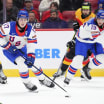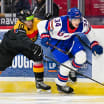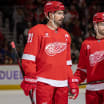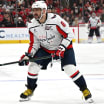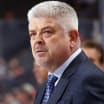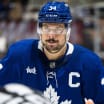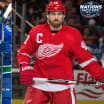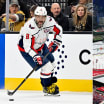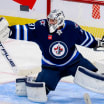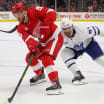MONTREAL -- Let's begin by correcting the oft-spoken idea that Jaromir Jagr is "ageless."
He'll turn 44 on February 15.
The other myths, the legendary stories, a few of the bizarre tales, and oh, that iconic mullet - well, there's a shred of truth, or more, in all of that.
It was 25 years ago today (Feb. 2) that Jagr, then an 18-year-old rookie with the Pittsburgh Penguins, scored the first hat trick of his NHL career.
Jagr still doing the trick 25 years later
Forward approaching another milestone in iconic career
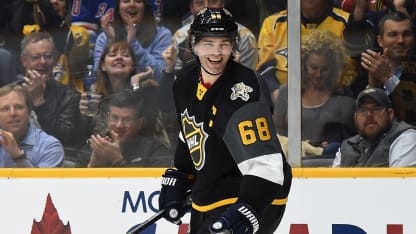
The goals -- Jagr's 14th, 15th and 16th of the 27 he would score that season -- came in Pittsburgh's 6-2 home victory against the Boston Bruins. Two were scored on the power play, the third at even-strength, against Bruins goalie Norm Foster.
Twenty-five years later, the Florida Panthers forward is knocking on the door of another milestone. And it will be a dandy for Jagr, an NHL greybeard who's travelled a meandering, multi-nation road from spectacular junior to introverted North American transplant to an elder statesman of the game who still, on occasion, can dictate the flow of play.
With 737 regular-season goals heading into a road game against the Washington Capitals on Tuesday, Jagr is just four behind equaling Brett Hull for the No. 3 NHL ranking all-time. Five goals will put him alone behind Gordie Howe, with 801, and Wayne Gretzky, atop the list with 894.
With 1,835 career regular-season points, Jagr is 15 behind No. 3 Howe on the all-time list and 52 behind No. 2 Mark Messier. The road to Gretzky will be long; he's trailing the Great One by 1,022.
Few were guessing in 1990-91 that Jagr would be breathing this rarified air a quarter-century later; fewer probably thought he'd enjoy this impressive longevity.
Through a 15-game drought in his rookie season, the homesick, English-challenged native of the Czech Republic had a single point.
A magnificent young talent at home for Kladno, a sniper who dreamed of making it big on this side of the pond, Jagr tilled fallow NHL fields for a time. But then the Penguins imported Jiri Hrdina, a Czech center, in a trade with the Calgary Flames.
Jagr, still in his teens, would stir and go on to play a key role in the Penguins' charge to a Stanley Cup victory that season, scoring three goals and 10 assists, skating in the long shadow of superstar captain Mario Lemieux.
The following season was Stanley Cup No. 2; Jagr scoring 11 and assisting on 13 in a 21-game postseason run.
It's a coincidence - or is it? - that among the anagrams for the name Jaromir is Mario Jr.
So here we are all these years later.
Two Stanley Cups; a member of the Triple Gold Club as a winner of the Stanley Cup, Olympics and world championships; five times a winner of the Art Ross Trophy as the NHL's leading point-scorer; recipient of the Hart Memorial Trophy as the player judged to be most valuable to his team; twice winner of the Ted Lindsay Award, the NHL's MVP as voted by his fellow players; a 10-time all-star.
His parking space in the Hockey Hall of Fame is reserved.
Jagr remains an incandescent presence with the Panthers, a role model for a generation of players, one of the rare athletes who transcends the game.
Judging by his interviews at the 2016 Honda NHL All-Star Game last weekend in Nashville, he's a pretty good comedian, too, journalists and live television hungrily devouring his bon mots.
A free spirit, Jagr's views don't please all. But at least he's earned his long leash.
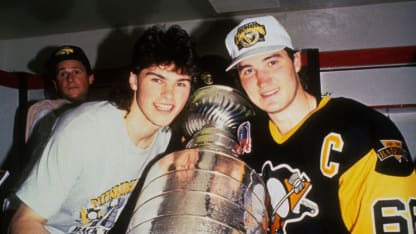
© B Bennett/Getty Images
As his fan-vote total swelled for the game, he playfully (we assume) asked that he not be elected, suggesting he didn't "want to die," adding that he was "too old."
But once in Nashville, Jagr made it clear that he hadn't been lobbying for a few lazy days on a beach.
"I was planning to work a little bit harder because during the hockey season, you don't really have much time to practice," he said. "So I was hoping … to do a lot more to get better on the ice and to get stronger. I didn't have a chance but that's OK. I'm not complaining."
Well, he was -- mildly.
"I have to be here, that's the thing," Jagr said. "I was voted in. I don't want to be suspended. I don't want to miss any games."
He has been defined in many ways, a man who can be a gregarious, larger-than-life prankster or a sullen figure or practically invisible, depending on his mood.
One such interesting description is "mercurial," an adjective defined by one source as "changeable, volatile, fickle, flighty, erratic".
"Capricious" would be another, that is, given to sudden and unaccountable changes of mood or behavior.
But a constant through Jagr's career has been the talent and finesse he's had in his toolbox, showcased in the jerseys of his eight NHL clubs, previously as a 16-year-old phenom at home in his country's top professional league.
He has taken his show on the road also, picking apart goaltenders in Russia and Italy with an artist's flair.
"The comparable player is Frank Mahovlich," legendary coach Scotty Bowman once said, quoted by The Hockey News in 1998 when the publication chose Jagr as No. 37 on its list of top 100 NHL players of all time.
"When Frank had full speed ahead and he had the defensemen backing off at the line, he could go inside or outside. He had that great reach. Both players could control the puck so well."
And like the case with many artists, Jagr's brush strokes have changed with the canvases of his career.
"When I was younger, I wanted to win the scoring titles," he told Dallas writer Peter Simek in a 2013 D Magazine profile. "That was my goal. When I win it, the season was good. And if I didn't win it, I didn't play good. I didn't have a good season. That was in my head. Everything in your head. Whatever you put in your head, it is going to happen.
"Everything changes with your age. You are different thinking. I think you are less selfish. When you are younger you try to prove to the world that you're the best, or whatever. And when you are paid the most on the team, if you are not the best on the team, the media go after you more than anybody. And it is not good if you have a bad season. It is not a good feeling, trust me. But when you are older you just think differently. I never look at the long stats."
You couldn't write the script of Jagr's remarkable hockey life as he skates toward Hull's 741 NHL goals.
He is an icon on each side of the Atlantic, worshipped at home as a national hero and a template for many NHLers and those who hope to be.
Jagr has seen tragedy from too close, on the bench of the Kontinental Hockey League's Avangard Omsk in 2008 when teammate Alexei Cherepanov, just 19, was stricken with cardiac failure that tragically took his life.
He's played with some of the best players in the world, while becoming one himself.
Through thick and thin, changing teams, coaches and systems, now skating with teammates literally young enough to be his sons, Jagr has just kept getting it done.
He put it in perspective last February to NHL.com's Dan Rosen, a few weeks before he was sent from New Jersey to Florida near the trade deadline for two draft picks:
"Where else can you go into an arena and have 20,000 people watching you and you make something great and they clap their hands, or they're booing you?" he said.
"Where else are you going to do that? It's a show. You're not going to find that excitement anywhere else. I'm going to sit at home and what, watch TV and say, 'I wish I was there?'"
For as long as he plays, fans should be thankful that Jaromir Jagr is on their televisions, not sitting with his feet up in front of one.

